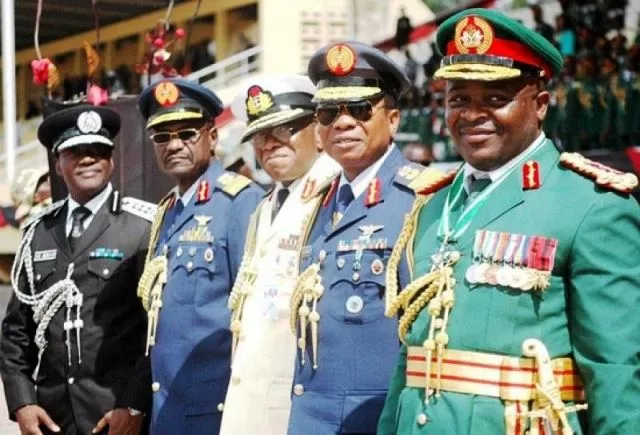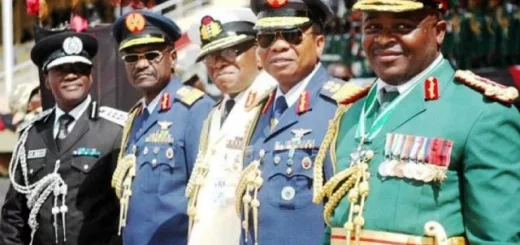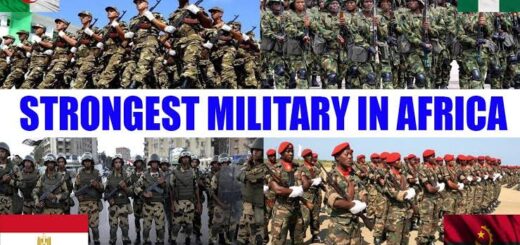Full List of Paramilitary Organisations in Nigeria And Their Roles
Nigeria is a country that has faced various security challenges over the years. To combat these security issues, the Nigerian government has established several paramilitary organizations. These organizations are responsible for maintaining law and order, protecting the country’s borders, and ensuring the safety of its citizens.

How many paramilitary agencies are there in Nigeria? According to an online report, there are nine first grade paramilitary bodies, which comprises of the Nigerian Police Force, Nigerian Customs Service, Nigerian Correctional (Prisons) Service, the Nigerian Immigration Service and the Federal Fire Service.
These paramilitary organizations in Nigeria are diverse and serve different purposes. The Nigerian Police Force is responsible for maintaining law and order, while the Nigerian Security and Civil Defence Corps (NSCDC) is responsible for protecting critical infrastructure and national assets. The Nigerian Customs Service is responsible for the regulation and control of the import and export of goods, while the Nigerian Immigration Service is responsible for managing the country’s borders.
This article will provide a comprehensive list of paramilitary organizations in Nigeria and their roles. It will also highlight the importance of these organizations in maintaining peace and security in the country. By providing this information, readers will have a better understanding of the role of paramilitary organizations in Nigeria and their contribution to the country’s security.
FULL LIST OF PARAMILITARY ORGANISATIONS IN NIGERIA AND THEIR FUNCTIONS
Nigeria has nine major paramilitary organizations that operate under the government to support the military internally in the country. These organizations are security forces that are not part of the military but possess similar organizational hierarchy, tactics, training, and sometimes roles that are comparable to those of the military. They can be thought of as a hybrid between the military and the police.
The first paramilitary organization in Nigeria was the Nigeria Police Force, which was created in 1849. Since then, several others have been established to support the government in maintaining security and order in the country. These organizations have a long and complicated history in Nigeria and have played a significant role in shaping the country’s security landscape.
Below is a list of all nine (9) paramilitary organizations in Nigeria and their roles:
THE NIGERIAN POLICE FORCE
The Nigerian Police Force (NPF) is the primary law enforcement agency in Nigeria, responsible for maintaining law and order, ensuring public safety, and upholding the rule of law. With a significant presence across the nation, the NPF plays a pivotal role in safeguarding the country’s security and assisting in various law enforcement functions.
Some of the key roles of the Nigerian Police Force include:
- Crime Prevention and Detection: The NPF works to prevent and investigate crimes, apprehending criminals and ensuring that justice is served.
- Traffic Control: They manage traffic flow, enforce road safety regulations, and respond to accidents on Nigerian roads.
- Public Order Maintenance: The NPF is responsible for handling public protests and demonstrations, ensuring they remain peaceful and lawful.
- Protection of Life and Property: They protect the lives and property of Nigerian citizens and residents.
- Criminal Investigations: The NPF conducts investigations into various criminal activities and gathers evidence for prosecution.
- Counterterrorism: They play a critical role in countering terrorist threats and maintaining national security.
- Community Policing: The NPF engages in community outreach programs to build trust and cooperation between the police and the communities they serve.
The Nigerian Police Force is a vital component of Nigeria’s law enforcement and public safety apparatus, contributing to the overall well-being and security of the nation’s citizens.
THE NIGERIAN SECURITY AND CIVIL DEFENCE CORPS (NSCDC)
The Nigerian Security and Civil Defence Corps (NSCDC) is a paramilitary organization in Nigeria tasked with a wide range of responsibilities aimed at ensuring the security, safety, and protection of critical assets and infrastructure in the country. Established in 2003, the NSCDC has become an integral part of Nigeria’s security apparatus, playing a crucial role in various areas.
Some of its primary roles include:
- Protection of Critical Infrastructure: NSCDC is responsible for safeguarding critical national infrastructure, such as oil and gas installations, power plants, and communication facilities.
- Disaster Management and Mitigation: The corps plays a vital role in disaster management, responding to emergencies like natural disasters and industrial accidents, and providing relief to affected communities.
- Security and Surveillance: NSCDC conducts surveillance and intelligence gathering to identify and mitigate security threats, including terrorism and sabotage.
- Licensing and Regulation: The organization regulates private security companies, as well as the issuance of licenses for private guard companies and security personnel.
- Civil Protection: NSCDC provides civil protection services, ensuring the safety of civilians during crises and maintaining peace and order.
- Anti-Vandalism: NSCDC actively combats pipeline vandalism, oil theft, and illegal oil bunkering, working to protect the nation’s resources.
- Community Policing: It engages in community-based security initiatives, fostering cooperation and trust between communities and security agencies.
The NSCDC’s multifaceted role in Nigeria underscores its importance in maintaining security and safeguarding the nation’s critical assets, while also promoting peace, safety, and civil protection.
THE NIGERIAN IMMIGRATION SERVICE (NIS)
The Nigerian Immigration Service (NIS) is a vital paramilitary organization in Nigeria responsible for overseeing immigration matters and regulating the movement of people across the country’s borders. Established to maintain control over Nigeria’s entry and exit points, the NIS plays a significant role in national security and immigration management.
The agency’s primary roles include:
- Immigration Enforcement: NIS enforces immigration laws, ensuring that individuals entering and leaving Nigeria comply with the country’s immigration regulations.
- Border Security: NIS is tasked with safeguarding Nigeria’s territorial integrity by securing its land, sea, and air borders, preventing illegal immigration, and deterring transnational crime.
- Issuance of Travel Documents: NIS issues passports, visas, and other travel-related documents to Nigerian citizens and foreigners in accordance with established procedures.
- Migration Control: NIS monitors and manages migration patterns, ensuring that migration occurs in an orderly and regulated manner, and that migrants comply with immigration requirements.
- Alien Registration: The agency maintains a database of foreign nationals residing in Nigeria and ensures their registration and documentation in compliance with the law.
- Combatting Human Trafficking and Smuggling: NIS works to combat human trafficking and the smuggling of goods and individuals across borders, which are critical challenges to national security.
The Nigerian Immigration Service plays a crucial role in ensuring the orderly movement of people and goods across Nigeria’s borders while contributing to national security and immigration control.
THE NIGERIAN CORRECTIONAL SERVICE (NCOS)
The Nigerian Correctional Service (NCoS) is a vital government agency responsible for the management and rehabilitation of inmates in correctional facilities across Nigeria. NCoS plays a critical role in the criminal justice system, focusing on the humane and secure custody of individuals who have been convicted of various offenses. Their primary aim is not only to confine offenders but also to promote their reintegration into society as law-abiding citizens. NCoS carries out this mission through a range of roles and responsibilities, including:
- Custody and Care: NCoS detains and supervises individuals who have been convicted by the courts, ensuring their welfare and safety while serving their sentences.
- Rehabilitation: The agency provides various rehabilitation programs and activities to help inmates acquire skills, education, and training, preparing them for a successful reintegration into society upon release.
- Reintegration: NCoS works to reintegrate former inmates into society by providing support, guidance, and opportunities for a fresh start, reducing the likelihood of reoffending.
- Community Service: The service also oversees non-custodial measures, such as community service, for individuals convicted of less serious offenses, aiming to keep them out of traditional correctional facilities.
- Reform and Modernization: NCoS continually strives to improve its facilities, policies, and procedures to meet international standards for humane treatment and rehabilitation of inmates.
The Nigerian Correctional Service plays a crucial role in the criminal justice system by not only detaining offenders but also focusing on their transformation and successful reintegration into society, contributing to reduced recidivism rates and enhanced public safety.
THE NIGERIAN CUSTOMS SERVICE (NCS)
The Nigerian Customs Service (NCS) is a vital paramilitary organization in Nigeria responsible for enforcing customs and excise laws, facilitating international trade, and safeguarding the nation’s borders. With a primary role in regulating the import and export of goods, the NCS plays a pivotal part in revenue generation and the prevention of illegal activities related to cross-border trade. The NCS is also the highest paid paramilitary organization in Nigeria today.
Their roles include:
- Customs Duties Collection: Collecting customs duties and tariffs on imported goods to generate revenue for the government.
- Border Security: Ensuring the security of Nigeria’s land, sea, and air borders to prevent the illegal movement of goods and people.
- Trade Facilitation: Facilitating legitimate international trade by processing import and export documentation, customs clearances, and inspections.
- Preventing Smuggling: Combating smuggling and the illegal importation of contraband items, including drugs, firearms, and other prohibited goods.
- Intellectual Property Rights Enforcement: Ensuring the protection of intellectual property rights by preventing the importation of counterfeit or pirated goods.
- Trade Policy Implementation: Implementing government trade policies and regulations to promote economic growth and protect domestic industries.
- Collaboration with Other Agencies: Collaborating with other law enforcement and regulatory agencies to enhance national security and enforce relevant laws.
The Nigerian Customs Service plays a crucial role in the economic and security landscape of Nigeria by ensuring the orderly flow of goods across its borders, collecting revenue, and preventing illegal trade activities.
THE NATIONAL DRUG LAW ENFORCEMENT AGENCY (NDLEA)
The National Drug Law Enforcement Agency (NDLEA) is a prominent paramilitary organization in Nigeria dedicated to combating drug trafficking, abuse, and related criminal activities. Established in 1989, it has since played a vital role in maintaining national security and public health by actively addressing the drug menace.
The NDLEA’s roles include:
- Drug Interdiction: NDLEA is responsible for intercepting and preventing the trafficking of illegal drugs within and across Nigerian borders.
- Arrest and Prosecution: The agency conducts investigations, arrests individuals involved in drug-related crimes, and ensures their prosecution in accordance with Nigerian laws.
- Public Awareness: NDLEA educates the public about the dangers of drug abuse and promotes drug prevention programs.
- Rehabilitation and Counseling: It provides support and rehabilitation services to individuals struggling with drug addiction, aiming to help them reintegrate into society.
- International Cooperation: NDLEA collaborates with international agencies and foreign governments to combat transnational drug trafficking networks.
- Drug Seizure and Asset Forfeiture: The agency seizes assets and funds derived from illegal drug activities, contributing to the disruption of criminal networks.
- Policy Advocacy: NDLEA advocates for drug control policies, conducts research, and provides recommendations to the government for effective drug control strategies.
NDLEA plays a pivotal role in safeguarding Nigeria’s youth and communities from the devastating impact of drug abuse and organized drug crime, contributing to the nation’s overall security and well-being.
THE FEDERAL FIRE SERVICE (FFS)
The Federal Fire Service (FFS) in Nigeria is a vital paramilitary organization responsible for fire prevention, firefighting, and disaster management. Established to safeguard lives and property from fire-related emergencies, the FFS plays a significant role in enhancing public safety and reducing the risk of fire incidents.
The functions of the FFS include:
- Fire Prevention: The FFS is actively involved in educating the public and raising awareness about fire safety measures to prevent fire outbreaks.
- Firefighting: They respond to fire emergencies promptly and efficiently, using specialized equipment and well-trained personnel to extinguish fires and save lives.
- Rescue Operations: In addition to firefighting, the FFS engages in search and rescue operations during fire incidents, ensuring the safety of those trapped or endangered.
- Disaster Management: The FFS is often called upon to manage and mitigate the effects of other disasters, such as industrial accidents, explosions, and hazardous material incidents.
- Public Awareness: They conduct campaigns and training programs to educate communities and organizations about fire safety, evacuation procedures, and the proper use of fire safety equipment.
- Regulatory Oversight: The FFS also enforces fire safety regulations and conducts inspections of public and private properties to ensure compliance with fire safety standards.
The Federal Fire Service plays a crucial role in enhancing fire safety across Nigeria, ultimately saving lives and protecting property from the devastating effects of fire emergencies.
THE FEDERAL ROAD SAFETY CORPS (FRSC)
The Federal Road Safety Corps (FRSC) is a prominent paramilitary organization in Nigeria that focuses on ensuring road safety, traffic management, and the reduction of road accidents. Established in 1988, the FRSC has since played a critical role in enhancing road safety across the country.
Their roles include:
- Traffic Management: FRSC personnel are responsible for regulating traffic flow, ensuring compliance with traffic rules, and controlling congestion on Nigerian roads.
- Driver’s Licensing: They issue and regulate driver’s licenses to ensure that only qualified and competent individuals are allowed to operate vehicles on the roads.
- Vehicle Inspection: FRSC conducts vehicle inspections to ensure that vehicles on the road meet safety standards, thus reducing the risk of accidents due to vehicle-related issues.
- Public Education: They engage in various educational campaigns to raise awareness about road safety, proper driving behavior, and the dangers of reckless driving.
- Accident Response: FRSC is often the first to respond to road accidents, providing first aid and facilitating the quick removal of accident victims to medical facilities.
- Road Safety Research: They conduct research to gather data on road accidents and traffic patterns, which helps in the development of policies and strategies to improve road safety in Nigeria.
- Enforcement of Traffic Laws: FRSC enforces traffic laws, including penalizing offenders for various traffic violations, thus promoting discipline and adherence to regulations on the road.
The FRSC’s dedicated efforts have significantly contributed to the reduction of road accidents and the improvement of road safety awareness in Nigeria, ultimately saving lives and reducing economic losses caused by traffic accidents.
THE ECONOMIC AND FINANCIAL CRIMES COMMISSION (EFCC)
The Economic and Financial Crimes Commission (EFCC) is a prominent law enforcement agency in Nigeria established in 2003 to combat economic and financial crimes, including corruption, money laundering, and fraud. With a mandate to investigate and prosecute individuals and organizations involved in financial misconduct, the EFCC plays a critical role in promoting transparency and accountability in Nigeria’s economic and financial sectors.
The functions of the EFCC include:
- Investigation: EFCC is responsible for conducting in-depth investigations into cases of economic and financial crimes, collecting evidence, and building strong cases for prosecution.
- Prosecution: They initiate legal proceedings against individuals and entities implicated in financial crimes, ensuring that perpetrators face the legal consequences of their actions.
- Prevention: EFCC works to prevent economic and financial crimes by raising awareness, educating the public, and collaborating with relevant institutions to develop and implement preventive measures.
- Asset Recovery: The commission identifies and recovers assets acquired through illegal means, returning them to their rightful owners or the state.
- International Cooperation: EFCC collaborates with international law enforcement agencies to track and extradite fugitives involved in cross-border financial crimes.
- Anti-Corruption Advocacy: EFCC engages in anti-corruption advocacy and public enlightenment campaigns to promote ethical behavior and discourage financial malpractice.
The EFCC plays a pivotal role in Nigeria’s ongoing efforts to combat corruption and strengthen the country’s economic and financial systems.
CONCLUSION
The above are the major paramilitary organizations that play a critical role in maintaining security and order in the country. The various paramilitary ranks operate under the supervision of the federal government and are tasked with various responsibilities such as combating smuggling, enforcing immigration laws, and providing emergency response services.

